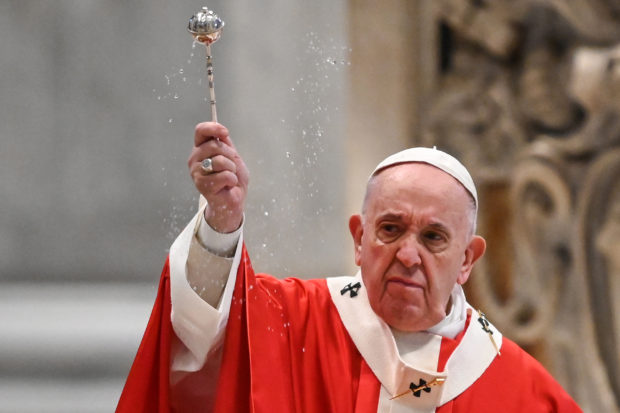
Pope Francis blesses attendees as he celebrates Palm Sunday behind closed doors in St. Peter’s Basilica mass on April 5, 2020, in The Vatican, during the lockdown aimed at curbing the spread of the COVID-19 infection, caused by the novel coronavirus. (Photo by Alberto PIZZOLI / POOL / AFP)
ROME — Pope Francis appealed Sunday for courage in the face of the novel coronavirus pandemic that has claimed more than 65,000 lives across the globe in just three months.
Pope Francis, who himself has been tested twice for the new coronavirus, delivered Palm Sunday mass by livestream with Saint Peter’s Square empty of the usual huge crowds.
“Today, in the tragedy of a pandemic, in the face of the many false securities that have now crumbled, in the face of so many hopes betrayed, in the sense of abandonment that weighs upon our hearts, Jesus says to each one of us: ‘Courage, open your heart to my love’,” he said.
‘Cure cannot be worse than the problem’
US President Donald Trump has already warned Americans to brace for a “very horrendous” number of deaths in the coming days, as the number of confirmed cases there surged past 300,000 – the highest in the world.
On Saturday, Trump warned that the United States was entering “a time that’s going to be very horrendous” with “some really bad numbers.”
“This will probably be the toughest week,” he said at the White House. “There will be a lot of death.”
But he stressed that the world’s largest economy – where over 8,500 people have died from the virus – cannot remain shut down forever.
“Mitigation does work but again, we’re not going to destroy our country,” he said. “I’ve said it from the beginning – the cure cannot be worse than the problem.”
Also on Sunday, Queen Elizabeth II was also set to give a rare address aimed at rallying Britain, where the government is warning of tougher measures on social distancing to try to curb surging infections.
Over 47,000 global deaths have been recorded in Europe, with Britain reporting a new daily high in fatalities, taking the overall toll to 4,300.
Queen Elizabeth’s “deeply personal” speech was to urge people to rise to the challenge posed by the coronavirus, and personally thank frontline healthcare workers.
“I hope in the years to come everyone will be able to take pride in how they responded to this challenge,” she will say, according to extracts released Saturday.
The British government warned it may ban outside exercise if people flout stringent guidelines aimed at curbing virus transmission as warmer weather stoked fears people could congregate in parks and open spaces.
The deadly march of the virus has left about half the planet confined to their homes, drastically altering life for billions of people and plunging the global economy into a deep recession.
With over 1.2 million people confirmed to be infected, the virus is also putting massive pressure on healthcare services in nations both rich and poor which are struggling to find enough staff and equipment.
Despite Trump’s bleak warning for the United States, there were glimmers of hope in hard-hit Italy, ground zero for COVID-19 in Europe, and in Spain.
Tide turning in Italy?
Italy, which has registered over 15,000 deaths, cheered after seeing the number of intensive care virus cases drop for the first time on Saturday.
Even some of the most cautious Italian health officials seized on the figures as evidence that the tide may be turning in the deadliest disaster the country has faced since World War II.
“This is a very important data point,” said civil protection service chief Angelo Borrelli. “It allows our hospitals to breathe.”
Spain, which is under a near-total lockdown, saw a third successive daily fall in coronavirus-related deaths with 647 fatalities, taking its total to over 12,400.
Although the number of new cases also slowed, Spanish Prime Minister Pedro Sanchez announced an extension of a lockdown until April 25.
At a field hospital in Madrid set up at a conference center, staff applauded whenever a patient was healthy enough to be discharged.
Builder Eduardo Lopez, 59, gave a “10/10” rating to the staff who cared for him “with tenderness and a great dose of humanity”.
The pandemic has hammered the global economy, with businesses hit hard as people are forced to stay indoors.
Governments have rolled out massive, unprecedented stimulus programs to ease the pain, but economists have warned that the crisis could worsen poverty levels with millions of jobs lost.
Poor economies, such as Iraq, are struggling, with charities and volunteers rallying to provide food to the needy.
“This is more dangerous than Daesh,” said Iraqi volunteer Mustafa Issa, referring to the Islamic State jihadist group that swept through a third of the country in 2014.
RELATED VIDEO